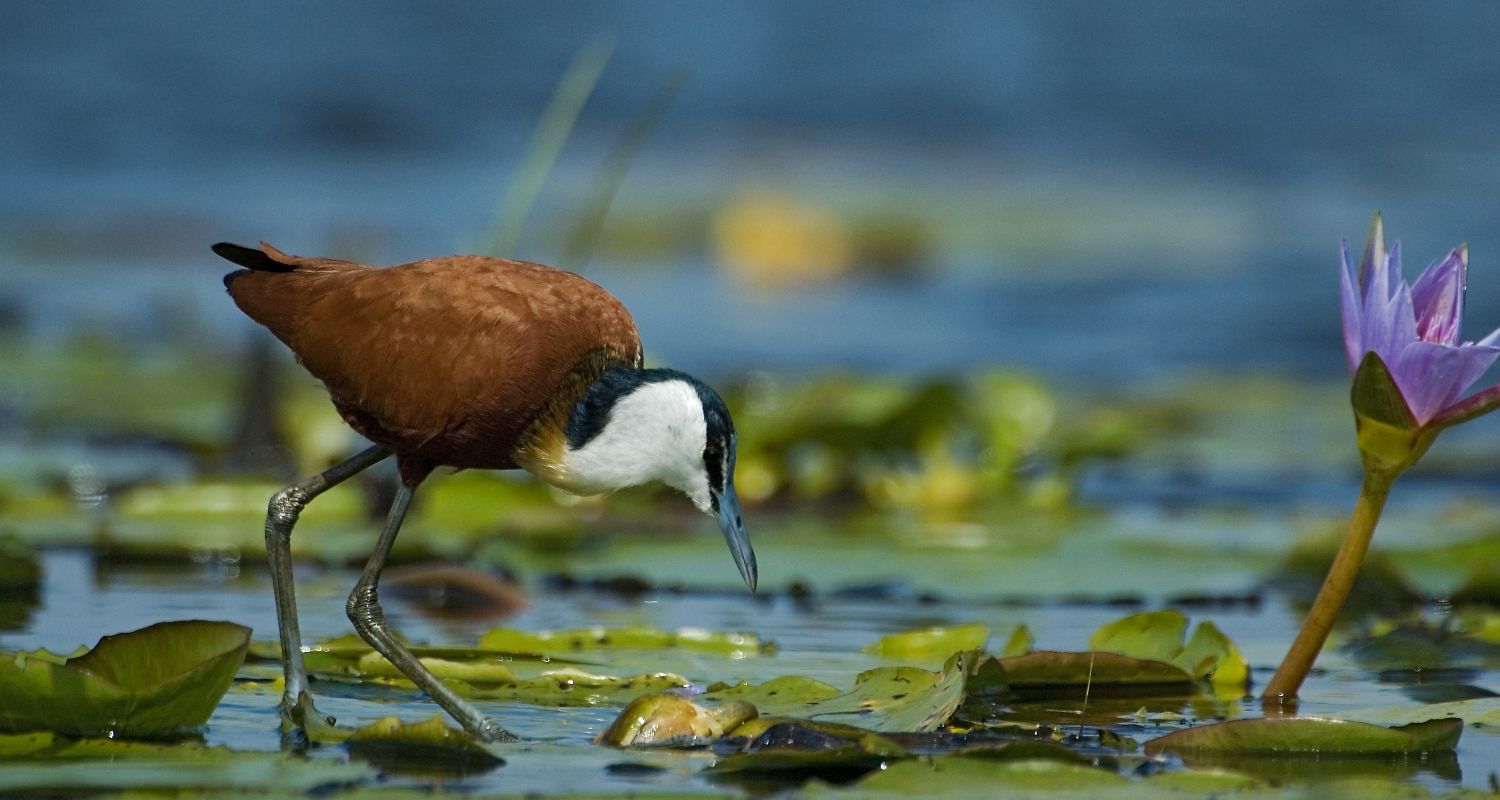
3-Day Mabamba Swamp & Entebbe Botanical Birding Tour
Mabamba Swamp Nature, Safari and Birding Price per person based on a group of 6persons Day by Day Program Centered
Home » Activities » Bird Watching
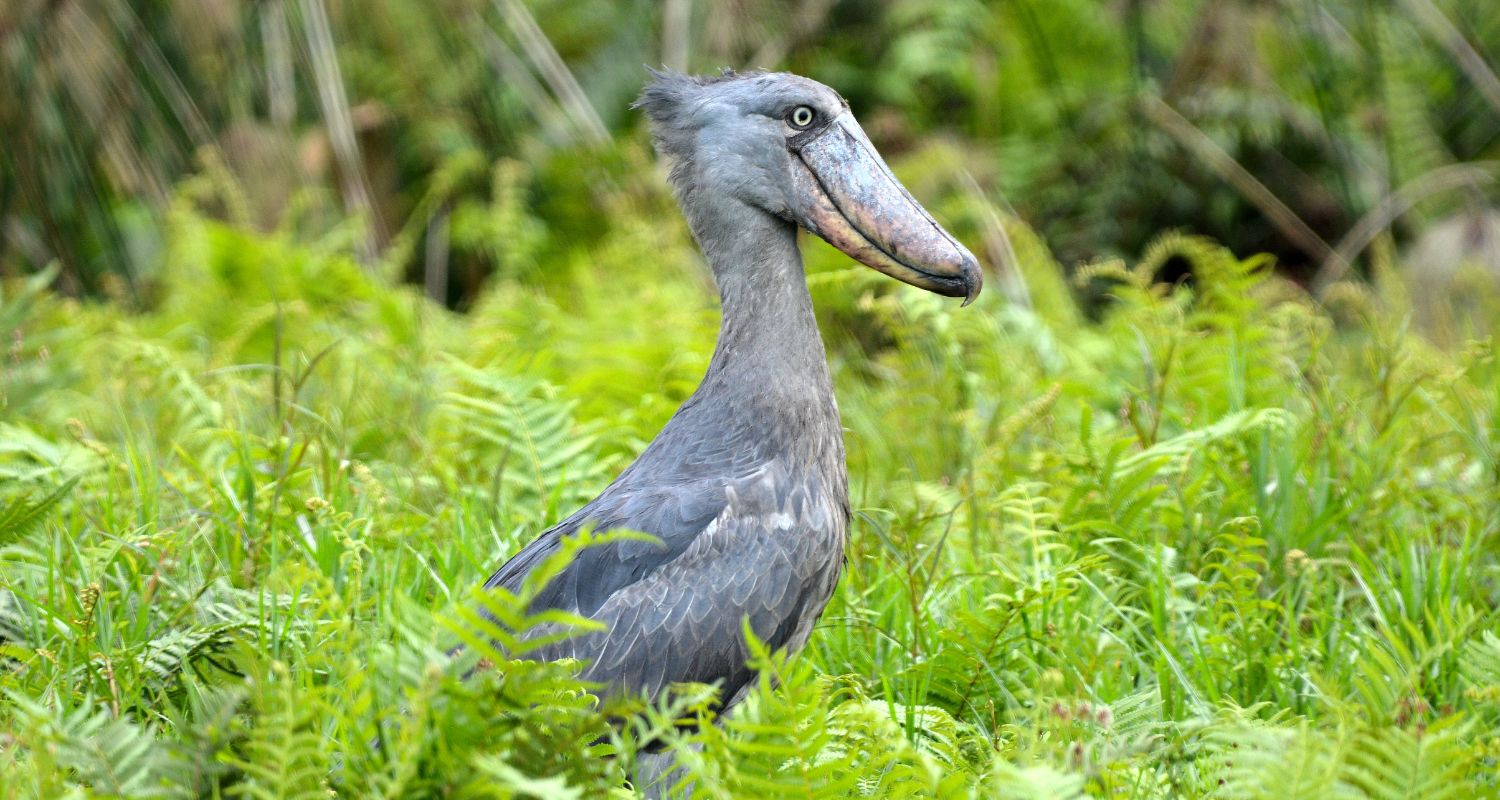
Uganda is often called the “Birding Capital of Africa,” with over 1,100 species recorded—more than any other African country. From the elusive shoebill in the Mabamba wetlands to vibrant sunbirds and the striking African grey parrots, bird lovers will find endless joy. Rwanda and Tanzania also boast incredible bird diversity, with Rwanda’s Nyungwe Forest and Tanzania’s Serengeti offering unique species.
Whether you’re an expert birder or a curious beginner, guided bird walks and boat safaris bring you closer to colorful flocks, rare species, and breathtaking natural soundscapes. Let us help you plan the perfect birding itinerary to enrich your East African adventure.

Mabamba Swamp Nature, Safari and Birding Price per person based on a group of 6persons Day by Day Program Centered
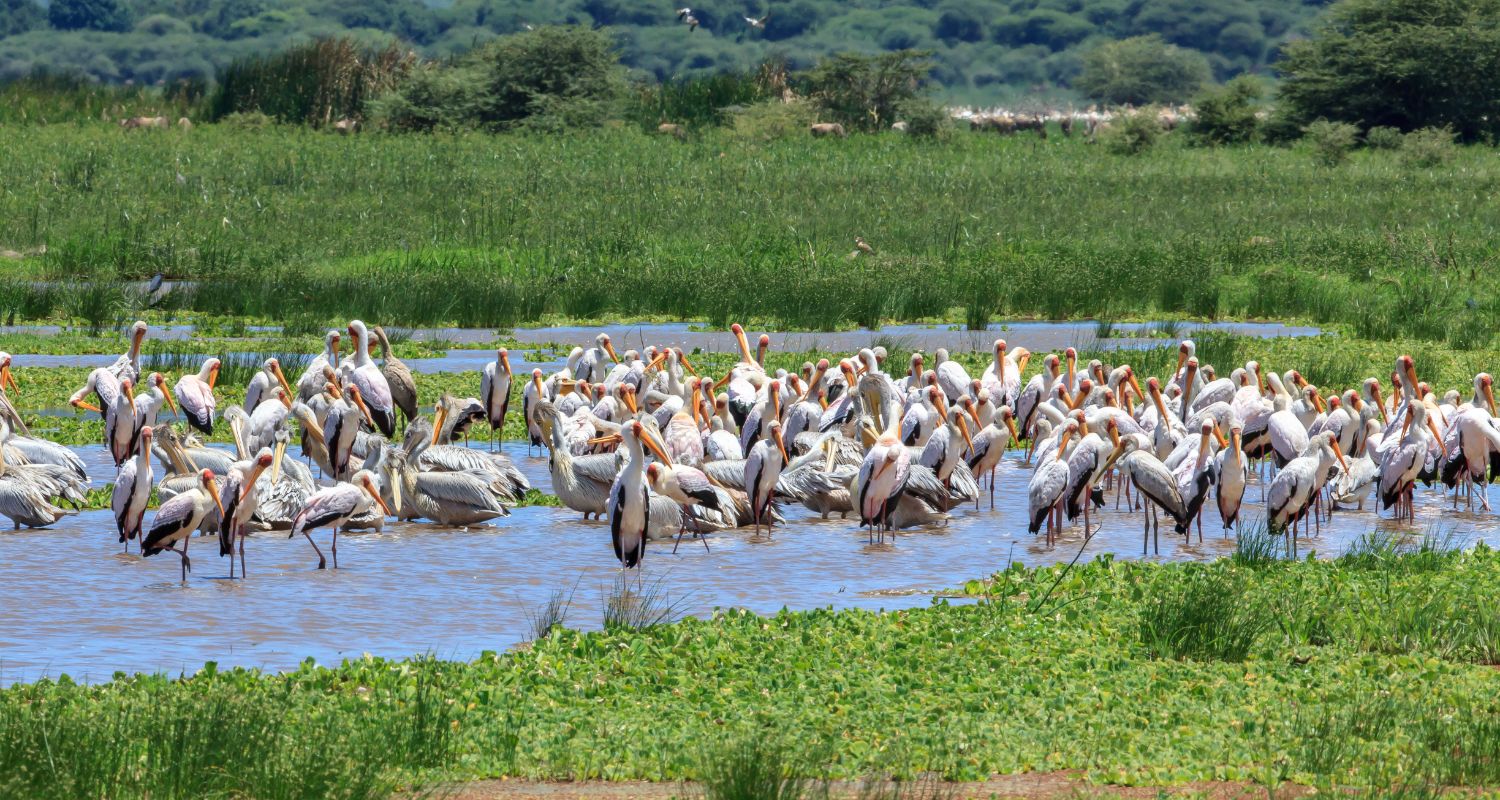
Kibale Forest, Bigodi Wetland Nature, Safari and Birding Price per person based on a group of 6persons Day by Day
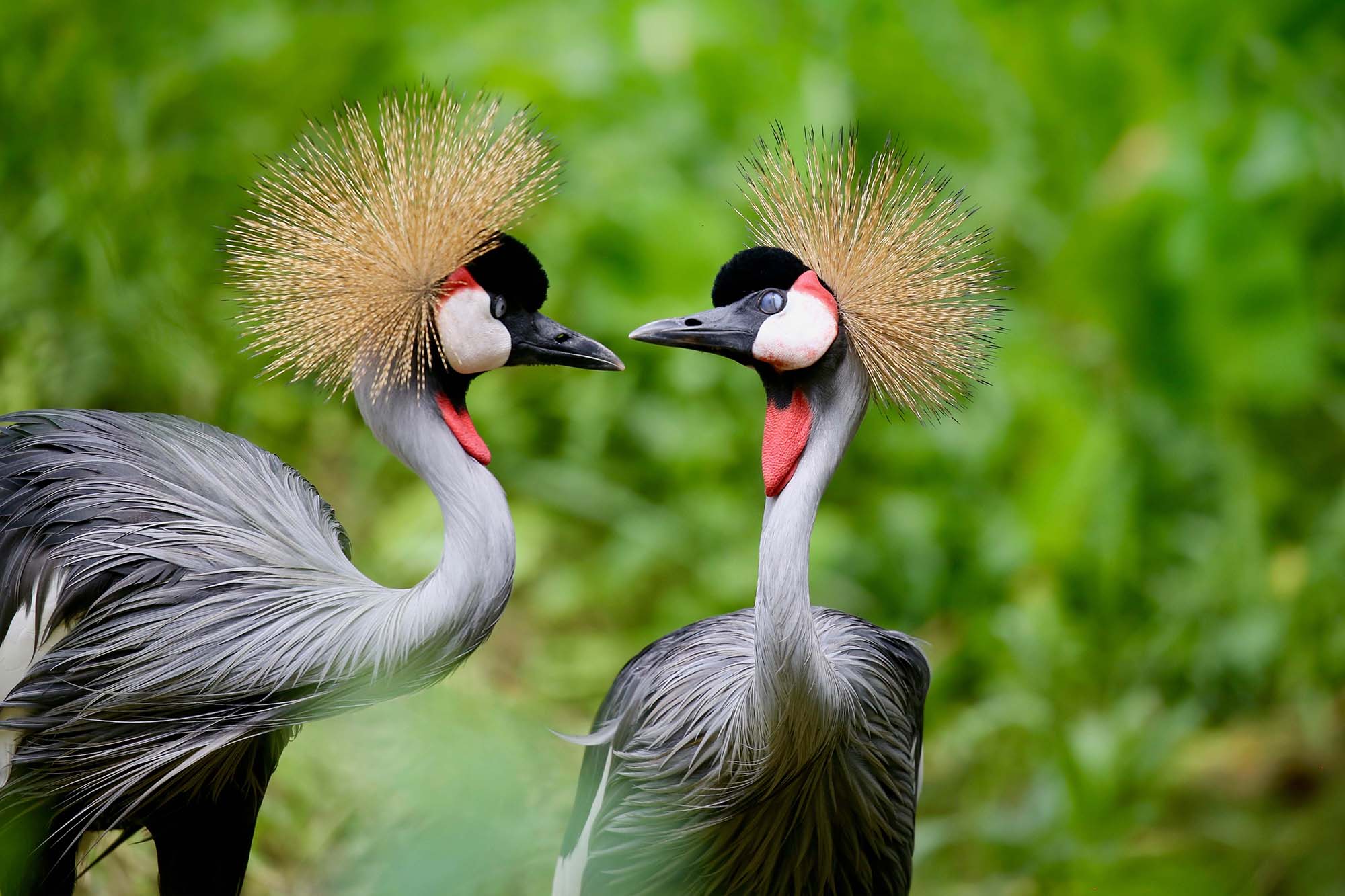
Queen Elizabeth, Semuliki Nature, Safari and birding Price per person based on a group of 6persons Day by Day Program

Mgahinga Gorilla N. Park Nature, Safari and Birding Price per person based on a group of 6persons Day by Day
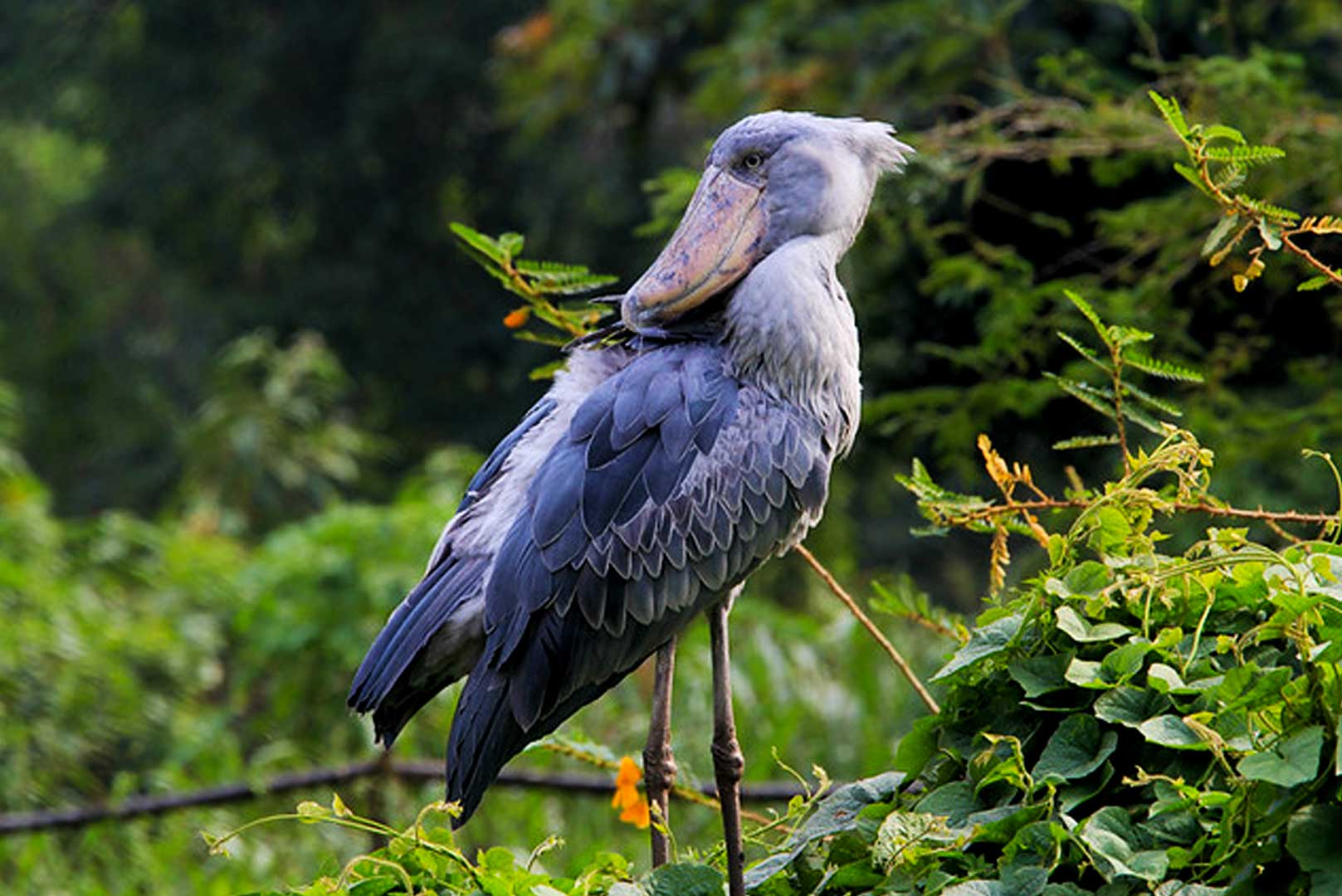
Mabamba Bay Wetland is one of Uganda’s most accessible and rewarding birding hotspots, especially renowned for sightings of the iconic shoebill stork. Located along the northern shores of Lake Victoria, just a short distance from Entebbe, Mabamba offers an exceptional blend of swampy habitats, papyrus thickets, and open water channels, making it an ideal destination for waterbirds. It is designated as a Ramsar Wetland of International Importance and has become a must-visit destination for birding enthusiasts, researchers, and conservationists. With over 300 bird species recorded, including a wealth of globally threatened and near-endemic species, Mabamba plays a vital role in Uganda’s reputation as a premier birding destination in Africa.
Mabamba is located on the western shoreline of Lake Victoria, about 50 km from Kampala and 15 km from Entebbe. It can be accessed by road via Kisubi or by a scenic boat ride from Entebbe across the lake, offering a unique journey through rural villages and lush wetlands.
The wetland is most famous for the shoebill stork, a bucket-list species for many birders. Other notable birds include papyrus gonolek, blue-breasted bee-eater, lesser jacana, African pygmy goose, malachite kingfisher, and swamp flycatcher. The area also hosts seasonal migratory species and various kingfishers, herons, and weavers.
Birding at Mabamba is done by traditional wooden canoe, navigated through narrow water channels in the papyrus swamp. Early morning visits offer the best chance to spot the shoebill hunting for lungfish. The slow-paced rides allow excellent photo opportunities and personalized guiding from local community bird guides. Nature walks and community visits in the surrounding areas can be arranged for added cultural immersion.
Birding in Mabamba is excellent year-round, but the dry seasons from December to February and June to August offer more stable water levels and clearer visibility. The wet months are also productive for migratory species. Early mornings are especially ideal for birding excursions.
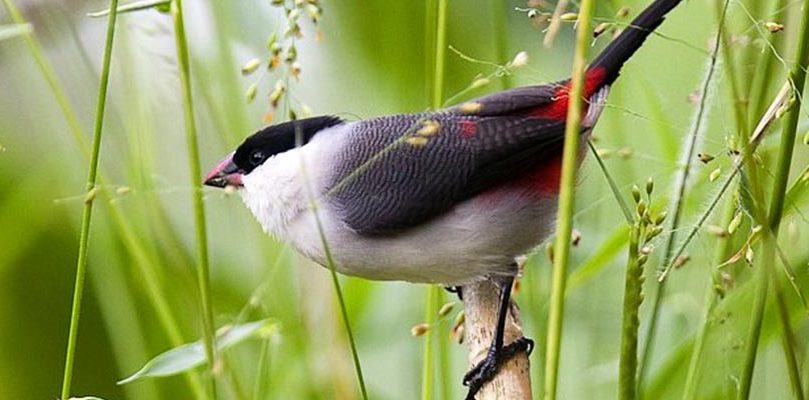
Queen Elizabeth National Park is Uganda’s most ecologically diverse protected area and a UNESCO-recognized biosphere reserve, offering birders an astonishing variety of habitats—from crater lakes and volcanic cones to grasslands and riverine forests. With over 600 bird species recorded, Queen Elizabeth is among the richest birding parks in Africa. The park hosts both resident and migratory birds, including rare forest dwellers and spectacular water birds. It is a prime destination for both casual and seasoned birdwatchers seeking scenic views alongside prolific avian life.
Situated in western Uganda, Queen Elizabeth National Park spans the districts of Kasese, Rubirizi, and Rukungiri. It lies about 400 km from Kampala and is accessible via a 6–7-hour drive or a scheduled flight to Mweya or Kasese airstrips.
Highlights include the African fish eagle, grey-crowned crane, shoebill (in the Ishasha and Lake Edward areas), saddle-billed stork, papyrus gonolek, African skimmer, and the elusive white-winged warbler. Migratory species also add to the spectacle from November to April.
Birding in Queen Elizabeth takes place in varied locations, including along the Kazinga Channel boat cruise, Maramagambo Forest trails, the Mweya Peninsula, and Ishasha sector. Guided game drives also provide opportunities to spot birds among other wildlife. The crater lakes and Kyambura Gorge add forest birding opportunities. Night drives offer a chance for nocturnal species like owls and nightjars.
The park is open year-round, but the best birdwatching conditions are during the dry seasons—June to August and December to February. Migratory birds arrive from Europe and northern Africa between November and April, adding diversity during the green season.
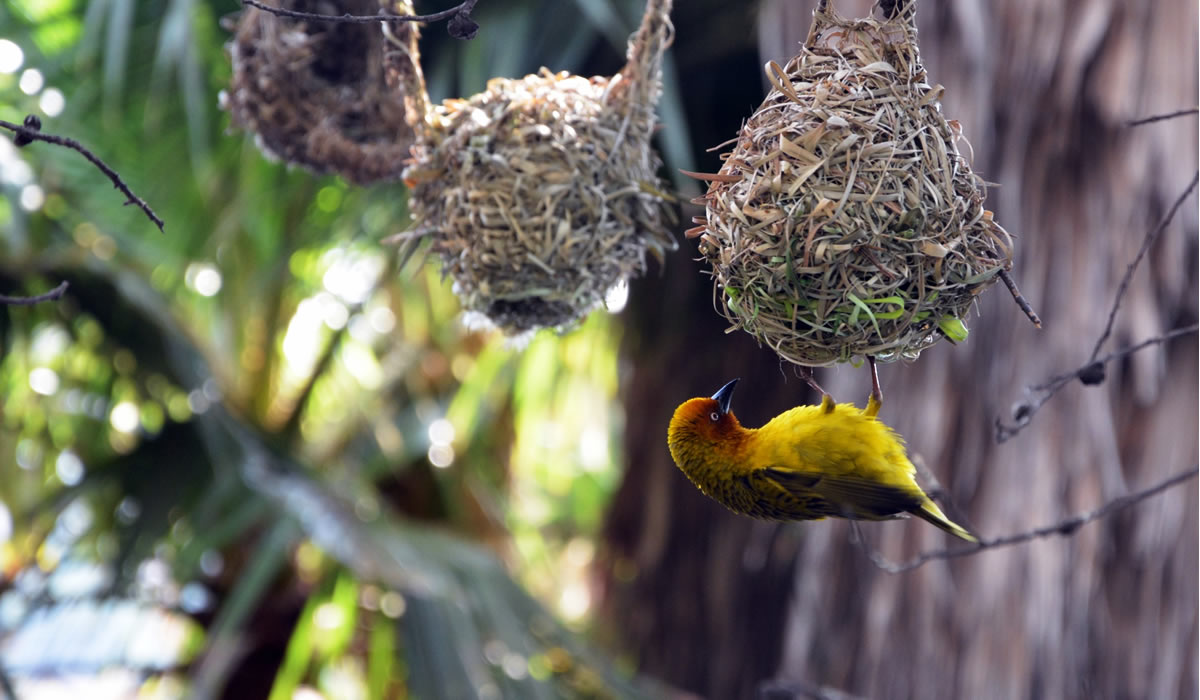
Bwindi Impenetrable Forest National Park is globally celebrated for its population of endangered mountain gorillas, but it’s also a birder’s Eden. Recognized as an Important Bird Area (IBA) by BirdLife International, the forest boasts over 350 bird species, including 23 Albertine Rift endemics. Bwindi offers a unique combination of montane forest ecology, misty altitudes, and dense undergrowth, making it one of the best birding sites in Africa. Birding here is deeply immersive and often combined with cultural walks or gorilla tracking, creating an unforgettable experience that combines biodiversity and cultural exploration.
The park is located in southwestern Uganda, on the edge of the Albertine Rift, bordering the Democratic Republic of Congo. It’s accessible by road from Kampala via Kabale or by domestic flight to Kihihi or Kisoro, followed by a drive to one of the park’s key sectors, such as Buhoma or Ruhija.
The forest is home to sought-after species like the African green broadbill, Shelley’s crimsonwing, handsome francolin, African wood owl, Grauer’s warbler, and black bee-eater. Albertine Rift endemics make Bwindi particularly attractive to international birders.
Birding walks are guided by expert ornithologists and local guides, primarily along the waterfall trails in Buhoma, Mubwindi Swamp in Ruhija, and the forest’s edge zones. Early mornings are ideal, and the walks are usually between 2 and 4 hours. Cultural encounters with the Batwa pygmies provide valuable insights into the local forest-dwelling heritage, often complementing the bird-watching experience.
Bwindi is open for birding throughout the year. However, June to August and December to February are considered the best times for forest walks and bird spotting, with minimal rainfall. March to May is the peak breeding season, so more birds may be active, although the trails are muddier.
With over 1,100 bird species, Uganda offers more bird diversity than any other African country. From dense tropical forests to wetlands, savannahs, and mountain slopes, the variety of habitats makes Uganda a birder’s paradise. Whether you’re seeking out Albertine Rift endemics or iconic species like the shoebill, Uganda delivers exceptional sightings at nearly every turn. The country’s compact size means you can experience multiple ecosystems in one trip—making it ideal for both casual bird lovers and serious ornithologists. With expert local guides and breathtaking landscapes, birding in Uganda is not just productive—it’s unforgettable.
Uganda is blessed with birding hotspots across its varied terrain. In Mabamba Swamp, just outside Kampala, glide through papyrus channels in search of the elusive shoebill. In Bwindi Impenetrable Forest, look for Albertine Rift endemics like the African green broadbill. Kibale Forest and Budongo offer great forest birding with species like the Nahan’s francolin and chestnut wattle-eye. For open savannah species, Queen Elizabeth and Murchison Falls national parks offer everything from fish eagles to bee-eaters. Whether you’re following warbler songs in the forest or watching kingfishers dive on a river cruise, Uganda is alive with birdlife.
The shoebill is one of the most iconic and unusual birds in Africa—and Uganda is one of the best places to see it. This large, prehistoric-looking bird stands over four feet tall and is found in papyrus wetlands. Mabamba Swamp, near Entebbe, is the most accessible location, where guided canoe safaris offer a good chance of spotting one. You can also see shoebills in Murchison Falls or the Nile Delta. With its massive bill, quiet nature, and slow stalking movements, seeing a shoebill is a magical moment for any birder.
While Uganda is a birding hotspot, Rwanda and Tanzania also offer exciting experiences for bird lovers. In Rwanda, explore Nyungwe Forest National Park, home to over 300 species including the red-collared mountain babbler and great blue turaco. Akagera National Park offers excellent wetland birding, with species like the papyrus gonolek. In Tanzania, birding in the Serengeti, Lake Manyara, and Ngorongoro combines beautifully with classic wildlife safaris. Whether you’re chasing endemics or enjoying colorful flocks near camp, East Africa’s birding experiences are as rich as they are rewarding.
Birding in Uganda, Rwanda, and Tanzania is excellent year-round, but the best months for bird watching are typically from November to April, when migratory species from Europe and Asia arrive. Uganda’s wet seasons (March–May, October–November) bring lush vegetation and high bird activity, while the dry seasons (June–September, December–February) offer easier access to remote spots. For those chasing specific species or breeding behaviors, your trip can be timed with expert advice. Whatever the season, you’ll find birds in full color and chorus across East Africa’s varied landscapes.
Birding in Uganda means covering forests, swamps, savannahs, and rivers—so packing right is key. Bring lightweight neutral clothing, waterproof walking shoes, and long sleeves for forest treks. Essentials include binoculars, a field guide (or birding app), a notebook, hat, sunscreen, and insect repellent. A camera with a good zoom is helpful for capturing distant or canopy birds. Don’t forget to pack a waterproof bag for gear and a refillable water bottle. We’ll provide a full checklist tailored to your trip and destinations to make your birding safari seamless.
New to birding? East Africa is a perfect place to start. You don’t need fancy equipment or years of experience—just curiosity and a pair of binoculars. Local guides are skilled at spotting and identifying birds, and you’ll learn to recognize calls, colors, and behaviors in no time. Many birding outings are done on guided walks, boat safaris, or gentle forest hikes, making it accessible to all ages and fitness levels. Whether you’re ticking off your first kingfisher or quietly watching a shoebill in the reeds, bird watching brings a peaceful, joyful rhythm to your safari.
Uganda is home to 23 Albertine Rift endemics—species that live nowhere else on Earth. In Bwindi and Mgahinga, look out for the Ruwenzori turaco, grauer’s broadbill, and handsome francolin. Budongo Forest is one of the only places to find the puvel’s illadopsis, and Semliki Forest adds Congo Basin species like the Nkulengu rail. Wetland areas offer rarities like the papyrus gonolek and white-winged warbler. With a knowledgeable guide, each outing feels like a treasure hunt—and Uganda’s rich birdlife ensures the surprises never end.
WhatsApp us
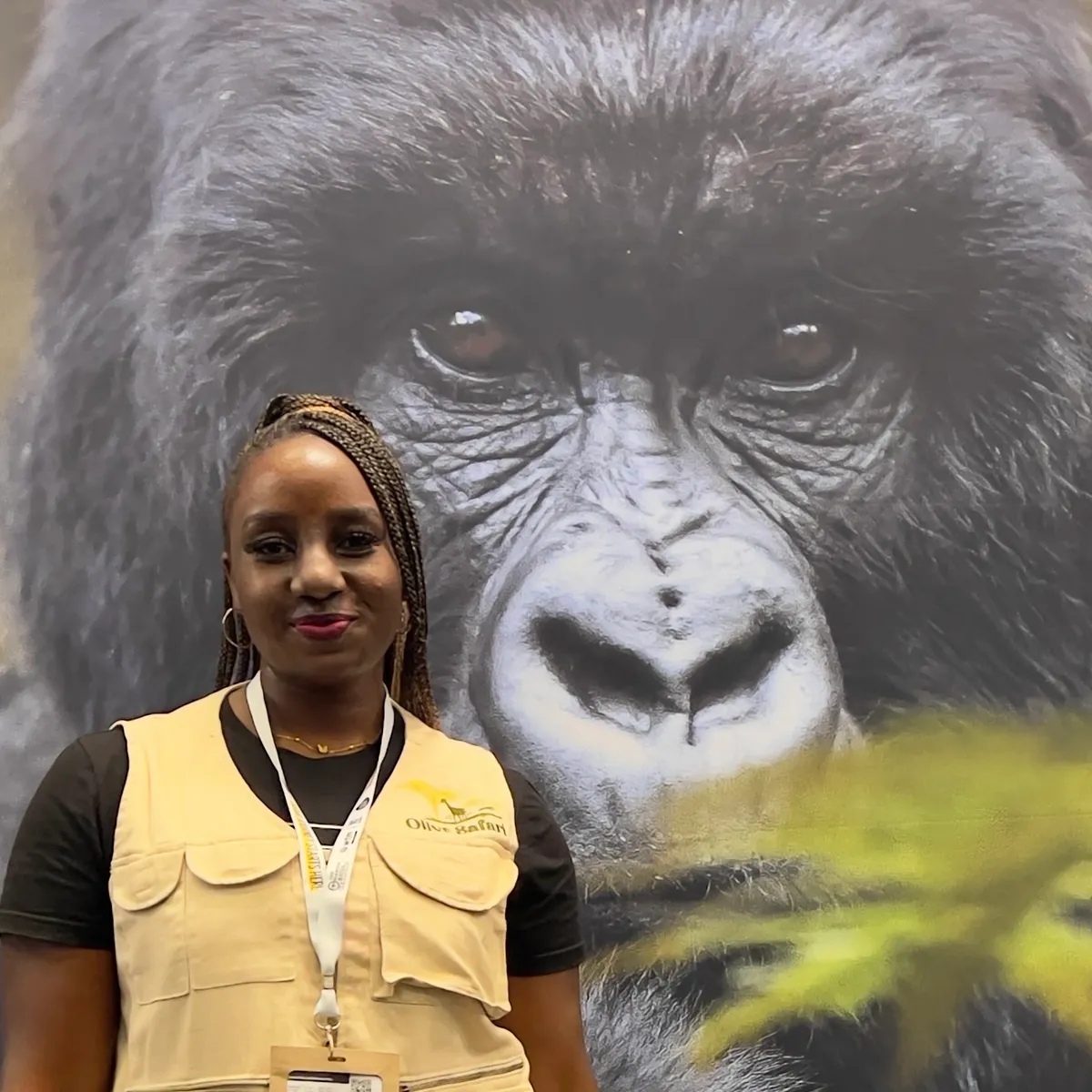
Cheryl, the eldest daughter of Olive, has embraced the responsibility of carrying forward her mother’s legacy with resilience and determination. After losing her father at the age of six, she was raised by her mother, Olive, with the support of Christer. Olive’s passing in 2017, when Cheryl was just 19, became a defining moment in her journey.
Having been involved in the foundations of Sunset Hotel Entebbe and Olive Safari Uganda from a young age, Cheryl stepped up to manage the businesses alongside Christer. Under his mentorship, she navigated the complexities of entrepreneurship and discovered her passion for tourism.
With a Master’s degree in Business Administration and hands-on leadership, Cheryl has been instrumental in maintaining loyal clientele at Sunset Hotel Entebbe, adapting it to post-COVID standards, and expanding Olive Safari Uganda. As a certified tour guide for Uganda, Tanzania and Zanzibar, she remains committed to upholding her mother’s vision of exceptional service and unforgettable travel experiences.

Christer, a Swedish education consultant with over 40 years of experience guiding travelers across Africa, co-founded Olive Safari Uganda with a deep passion for the continent’s wonders. His extensive journeying, particularly through Zimbabwe, Uganda, Tanzania, and Kenya, enriched his understanding of Africa’s landscapes and cultures. As a consultant, he also contributed to education and development, notably establishing an automotive school in Zimbabwe. His work with the Global Journey program brought him to Uganda, where he collaborated with municipalities and fell in love with the country’s heritage.
During this time, he met Olive, whose exceptional leadership and organizational skills later turned their professional relationship into a personal one. Their shared vision led to the creation of Olive Safari Uganda in the early 2000s, followed later by Sunset Hotel Entebbe. While Christer split his time in Sweden managing the Global Journey program, Olive oversaw daily operations. Today, Olive Safari Uganda embodies Christer’s seasoned expertise as a guide and strategic insight, paired with Olive’s dedication, delivering outstanding safaris that showcase Uganda’s beauty and beyond.
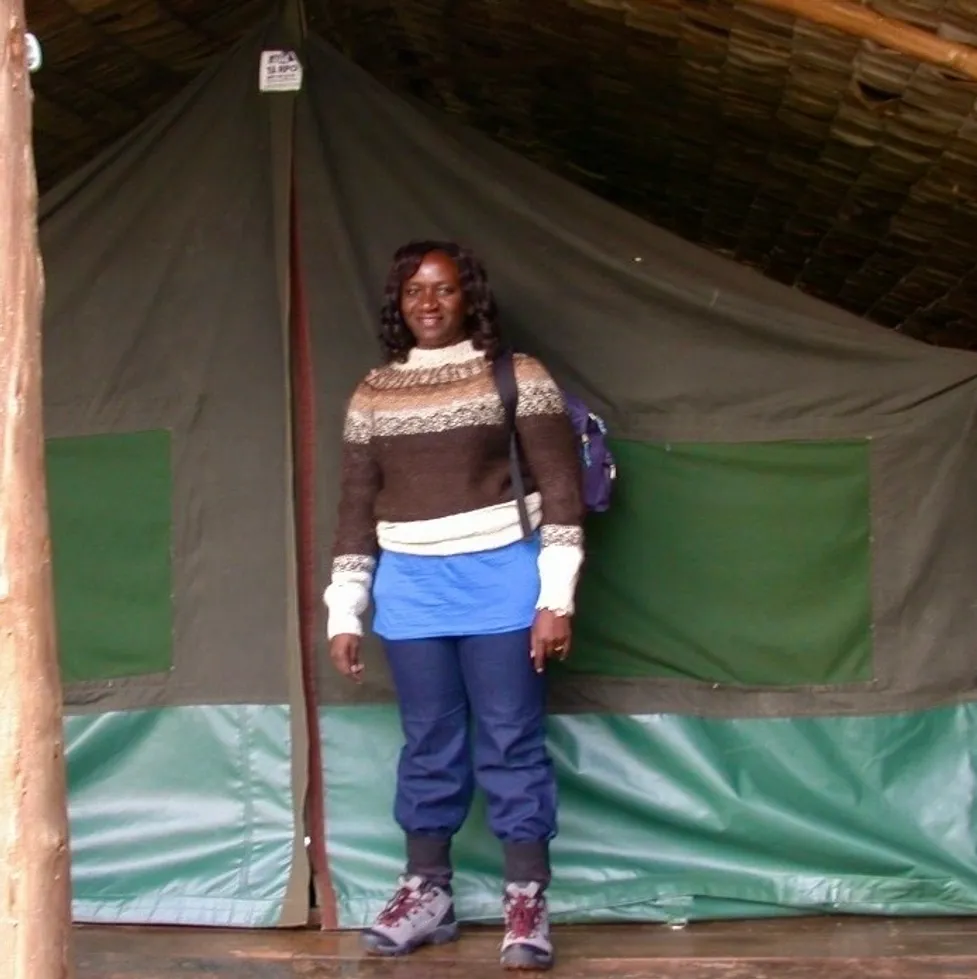
Ayebale Olive, co-founder of Olive Safari Uganda, brought over 20 years of community service experience into the world of tourism. As secretary to Entebbe’s Mayor, she honed her skills in program management and international partnerships, playing a key role in the Global Journey program that linked Uganda and Sweden.
It was through this program that she met Christer—three years after the passing of her first husband, while raising three children. United by a shared passion for travel and discovery, they founded Olive Safari Uganda in the early 2000s. Their commitment to exceptional service quickly set the company apart.
As demand grew, they expanded their vision by establishing Sunset Hotel Entebbe, creating a welcoming space for travelers exploring Uganda. Olive’s legacy lives on, shaping the company’s dedication to authentic and unforgettable safari experiences